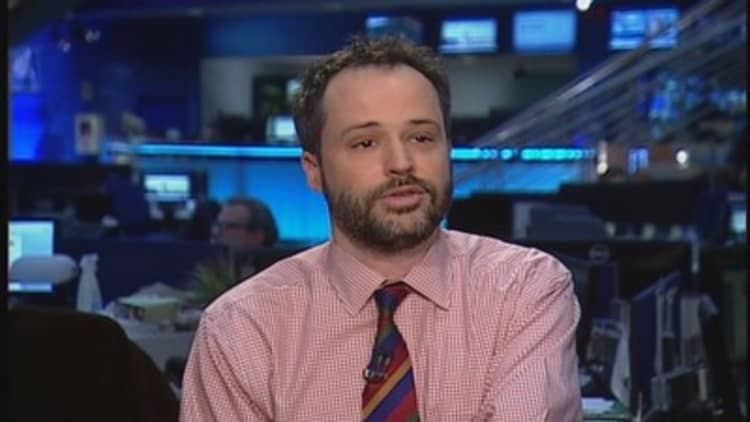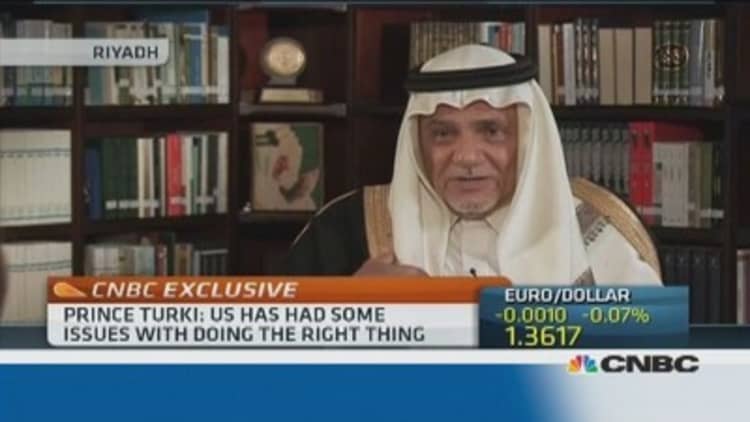Energy traders are closely watching renewed fighting in Iraq, trying to gauge worst- and best-case scenarios for OPEC's second-biggest oil producer—and the coming weeks could be critical.
"This situation now certainly has the market on tenterhooks. It's why we're seeing the price of oil somewhat elevated" despite a period of relatively contained demand, said John Kilduff, founding partner of commodities-focused investment firm AgainCapital. "This is a very troubling development for the oil market for consumer nations," Kilduff said.
(Read more: Oil price caught up in fallout from Iran nuclear deal)
This month, the Iraqi government of Prime Minister Nouri al-Maliki to the Islamic State of Iraq and the Levant (ISIL), a group that wants to establish a strict religious state across western Iraq's Anbar province and eastern Syria.
The worst scenario is for the Kurds to say, ‘OK, enough of you guys. We don’t want anything to do with you. All non-Kurds out.’ They can do that. They have the resources. They have a lot oil.Farouk El-Bazresearch professor, Boston University
News media, particularly in the United States, have made much of ISIL's declared allegiance to al-Qaeda. But more important for Iraq and the wider region, Middle East watchers say, is the fact ISIL is a Sunni movement in a Shia-majority country. For that reason, any worsening of violence in Fallujah could spark wider unrest across Iraq or the larger Middle East.
"The latest episode establishes another theater in a violent Sunni-Shiite regional power struggle that is already taking place in such places as Syria, Lebanon and Bahrain," said Ted Carpenter, senior fellow for defense and foreign policy studies at the Cato Institute. "It is dangerously simplistic to attribute the new turmoil in Anbar entirely to the actions of [an] al-Qaeda affiliate."
(Read more: Iran puts out the welcome mat for Big Oil)
Reports from Anbar have indicated that ISIL even enjoys some support from otherwise unradicalized Sunnis in the region, though sources who spoke with CNBC disagreed on that point. Al-Maliki has systematically placed his fellow Shiites in powerful government positions in Iraq and has drawn Iraq closer to Shia-dominated Iran. He's widely accused of alienating Anbar's minority Sunni population.

, though pipelines transport 1.5 million to 2 million barrels of oil through the province daily. But violence in the region still affects markets, said Seth Jones, an associate director RAND Corp.'s International Security and Defense Policy Center and a former senior adviser to the U.S. Special Operations Command.
"This is not the area where most of Iraq's oil fields are located, but instability in general in Iraq and the perception that there could be a civil war may affect energy markets," he said.
Jones was quick to say he believes an outright civil war in Iraq is unlikely, but he and others who spoke to CNBC said that chaos in Anbar could inspire other groups that are already unfriendly to al-Maliki's government and Shiites in general—especially the Kurds in Iraq's oil-rich north—to become restive themselves.
"The worst-case scenario is for the Kurds to say, 'OK, enough of you guys. We don't want anything to do with you. All non-Kurds out'," said Farouk El-Baz, a research professor at Boston University who served as adviser to the former Egyptian government of Anwar Sadat. "They can do that. They have the resources. They have a lot of oil. Then the Kurds in Iraq and Turkey and Syria will all fight for their own nation."
The coming weeks are critical.
After initially taking a belligerent tone toward the ISIL fighters in Fallujah, al-Maliki this weekend said the Iraqi army won't attempt a full assault on the city. The military's ability to retake Fallujah is doubtful anyway—it took more than 13,000 U.S. Marines, soldiers and their allies about 1½ months to take control of the city at the second Battle of Fallujah in 2004.
Al-Maliki has shown signs of trying to entice local tribal leaders to fight ISIL, but with the Iraqi army now surrounding Fallujah, an assault or bombardment is always possible. Regardless, the prime minister will feel pressure to act soon.
Parliamentary elections are set for April, and factions opposed to Iraq's Shiite-dominated government are likely to foment more trouble ahead of voting, said Charles Lister, a visiting fellow at the Brookings Doha Center. "Violence will likely reach a peak in the days and weeks prior to the elections," he said.

The latest violence comes at a time when Middle Eastern oil production had appeared closer to some semblance of stability
As 2013 came to an end, events seemed to be aligning for an increase of oil supplies from the region. Libyan production, disrupted since that country's civil war, looked as if it may come back online. More importantly, Iran began edging toward a possible nuclear deal with the West that could result in a lifting of export sanctions there.
(Read more: Iran nuclear deal to take effect Jan. 20)
The fall of Fallujah changed all that, said Kilduff.
"We were looking at maybe going below $80 a barrel and a gas cost of below $2.50 a gallon on average, but it doesn't look like that's going to happen now," Kilduff said.
"We're all just holding our breath here," he said. "The Iraqi government has made enough noise for the energy market to believe something is imminent."
—By CNBC's Ted Kemp and Yousef Gamal El-Din. Follow them on Twitter at @TedKempCNBC and @youseftv.


